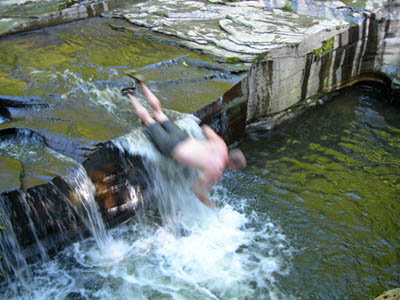I saw a jet trail in the sky this morning and wondered why there aren’t so many of them any more. And instantly started grinding through the useless, absorbing little inquisitions that keep the mind from wasting its time on lesser matters like making a living. I’ve learned to be wary of the first, natural hypothesis of any 53-year old mammal’s brain, which is simply that the world is going to Hell, damn it. I’ve learned to squint around that little mental cataract and formulate slightly more rigorous options, little lists of possible responses like the heads-up display that leads the Terminator to choose “Fuck you, asshole.” Standing at the top of the alley, the dog sniffing the weeds beside me, I came up with three quick possibilities for the scarcity of jet trails:
1. Jet trails must be some sort of condensation of hot exhaust in cold air; so, because of global warming, the outer air isn’t as cold so condensation doesn’t form.
2. Better engines and jet fuel mixes mean less exhaust; hence, fewer jet trails.
3. There are as many jet trails as ever, idiot. You’re just getting old and whiney: “When I was a boy, there were jet trails so thick the woolly mammoths used to trip over them….” Shut up and keep walking.
My inclination is to go with number three. I’ve always liked the story of the talking cow in Germany, told as a cautionary tale by some damn German intellectual. It seems there was a talking cow in one of the provinces, and instantly all the savants competed to explain its miraculous verbosity, until somebody finally had the sense to go see the cow. The cow couldn’t talk.
So it’s very, very possible I just don’t see the trails any more. After all, there was a period from early adulthood to middle age when I never saw any butterflies, and it would have been easy enough to slot into the easy world-going-to-Hell explanation: pesticides! Urban sprawl! Butterfly genocide! Then I had time on my hands again, and no car, and there they were, the same old butterflies. Maybe not as many or as gaudy; after all, the sprawl and the pesticides were real changes; but mainly I’d just been riding around in cars, busy and full of myself, as is proper with dumb strivers of that age. Once I was unhorsed, there were the butterflies again, fluttering around uselessly like me again.
But that really doesn’t explain the lack of contrails, because I’m on foot these days. And unemployed. Plenty of time to see anything in the sky. My days consist of lugging this autistic dog around, this so-called Great Dane we now know to be a half-Dalmatian mongrel fobbed off on us by the woman who ran that bizarre miniature horse farm where we bought the dog. Harlequin Dane—hah! Spotted manic hound, telltale narrow snout and barrel torso, no Dane! And with none of a Dane’s aristo drollery and ease. Which means she takes three hours of walking a day, and that’s only a containment policy at best.
So we’re out there, the dog and I, for hours a day. God knows nobody else requires my presence, not even the last-ditch schools in Inuvik and Nunavut who have politely declined my services. So you’d think that if there were jet trails to be seen up there as we walk the verdant alleys of unemployment, we’d see them. And they’re not there, not in the glorious sharply etch-a-sketch Nazcan sky scrawls I remember. I remember a cool fall day on the tanbark of Oak Park Elementary, clinging to the greasy metal bars of the jungle gym, full of the planet-wide anticipation of the fact that my Uncle Jim, the Jesuit, was coming to California to see us in a Boeing 707. And there in the sky, between those ring bars that were always eager to bash my big crewcut head, were trails being cut second by second in the fresh Kennedy sky.
Well, by this time “the freshness of night has been fresh a long time,” Stevens says, and the freshness of day too. It’s as fresh as Safeway sushi by this time, and that is, after all, the likely explanation for absolutely every perception arising from a mammal brain in late middle age: you’re wearing out, and so you assume the world is wearing out.
I know that, and it makes global warming news very hard to process. The planet is, by all accounts, going to Hell, but I know very well every 53-year old has said the same thing. But it’s not me putting those stories in the paper; it’s not me imagining all that about Antarctica melting; that’s actual, isn’t it?
Sure, but you have to remember the sliding scale of dissolution. Every generation of decaying old male primates like me has had a global warming to be terrified about; they just keep changing the venue. If any Newgrange-era Dolan made it to age 53, and without genes I doubt it, he had other horizons on which to focus his terror of the dissolution that was afflicting his soft tissues. He could be sure, maybe, of the return of winter, but that didn’t thrill him very much, and wouldn’t thrill you either if you lived in Bronze-age Northern Europe. On the fucking contrary. “Yay, there’s plenty of cold left! No global warming here! Just listening to that last surviving child of mine coughing its lungs out! No risk of the ice shelf melting here!” And by that he meant the one above his wretched doorframe.
He had other dissolving shores. They’re just hard to imagine now. Changes in the reburial cult, maybe: “Every year they dig the heads up earlier! It’s supposed to be three years, minimum! Lately it’s down to two! And what about those spot-beards? Soon the roofbeams will crow a week before the solstice! Oh, then there’ll be Hell to pay! Then they’ll see what’s what!” They weren’t very what you’d call rational, the Celts. I remember landing with relief in the Icelandic sagas after spending weeks of a Medieval Lit class among the gibberings of the Celts; it was like talking to a dry, sane, worldweary cop after escaping from the Manson family.
Which is to say: the only possible reason those jet trails are fewer is that on the only landscape that really exists, the inside of this bald skull, there’s no room for fresh scratches any more. It’s all been scratched already, all the stupid scuffs and scratches you get on the way to realizing you’ve done absolutely everything wrong.
And yet the ice shelves are dissolving. This is the weird part. I can say all day that the grief of watching the polar bears die is nothing more than selfish sorrow at the way my cortex is popping and frying like a 1965 film strip left too long over the light bulb—but they are dying. That much is true. And that cortex is dying too; that’s true too.
And thus we come to the great falls, the Niagara that Schopenhauer spent his life standing beside, shouting over the roar, trying with comic Prussian naivete to enlighten the terrified mammals clinging to the various barrels, logs, and flotsam merrily floating toward the edge: “Your will to live is no more and no less valid than that of every blade of grass, dummkopf! Do you hear me? Your pitiful English piety is the most wretched Urdummheit! Face the cataract!”
The poor old Germans. They actually believed in the poor old mind. The only real surprise is that European culture was so brave and unchristian, for a little while, that they listened to him. That would be hopeless now. As nearly as I can tell, this is a cowardly eddy, this era, just upstream of the cataract. Which is why I can’t pursue the simplest, most obvious solution to the problem of watching my cortex fry like an overheated film strip: drugs. There are medications that could hide this unpleasant sensation, but they have the unacceptable side effect of pleasure. And pleasure, for the vindictive late-medieval sensibility now dominant, is the one side effect which cannot be tolerated. We are going to paddle around this eddy, we are going to ignore the cataract, we are going to watch some surprisingly badly done movie said to be inspirational together through the spray and roaring. Odd, isn’t it? I can’t help thinking that even the Celts, if they’d had the contemporary pharmaceuticals, would have been sensible enough to sanctify them, use them.
It seems pretty childishly obvious: if the brain is the only fact, squirt something on it to make it feel a little less wretched as it watches its world kicked to death while its body sickens. That’s what we’re talking about, a life spent like Alex in Clockwork Orange: eyes tweezed open, watching somebody kicked to death while becoming violently nauseated.
You’d think. Unless you knew any social history at all. Whatsoever. Because actually the game is about forbidding, always and everywhere. In the Pacific Islands, where all they had was miserable Kava, they went to absurd lengths to forbid it, starting with women, of course. What you have, wretched as it is, must be prohibited.
And that prohibition yields hours, years of fun in the circumvention, and that distracts everybody nicely from that constant hissing, frying sound, the film strip popping like the edges of an egg forgotten on the range. This is your brain without drugs. Probably the central fact is they won’t FedEx Tramadol to Canada, the bastards. Probably the central fact is that it’s four in the morning, you don’t sleep well at this age. Probably the central fact is antibiotics—otherwise I sure as Hell wouldn’t be awake, ie alive, at this hour, this age. Probably anything you close your eyes and point to is the central fact.

A sliding scale, that’s all. This generation of decaying primates has a dying planet to terrify us; four thousand years ago it was something else, quite real too, but not important now. Clan warfare, cattle raids, the disappearance of this or that. Something’s always disappearing, vanishing, going extinct. And that’s not in any way a hallucination. It’s just obvious; it’s Niagara Falls, with Schopenhauer standing beside it screaming at us as we go over, “You’re going over the falls! The rest is nonsense!”
Like, duh.
And when I get to that point I tell the jet trail problem to Katherine and, quietly brilliant as always, Sherlock Holmes without the male ego, she asks if there were any big military bases near our house when I was a kid. Of course. Concord Naval Air Station: their jets flew higher; the air up there was colder, the trails sharper, like the expert ski trails. And it was, after all, 1965. My tribe was slicing up the sky real good back then.
End it there? A little ironic nostalgia for Nam? Kind of a cheap effect. Which seems appropriate. Wherever you end it, it’s the same hissing sound, and it means exactly what you think it means. Tinnitus, high blood pressure, Niagara, the ice calving for the last time—the last for you, this particular dying animal, anyway.
John Dolan is the author of, most recently, Pleasant Hell. Contact him at dolan@exiledonline.com.
*****
Read more: death, Schopenhauer, Tramadol, John Dolan, Fatwah


Got something to say to us? Then send us a letter.
Want us to stick around? Donate to The eXiled.
Twitter twerps can follow us at twitter.com/exiledonline
















